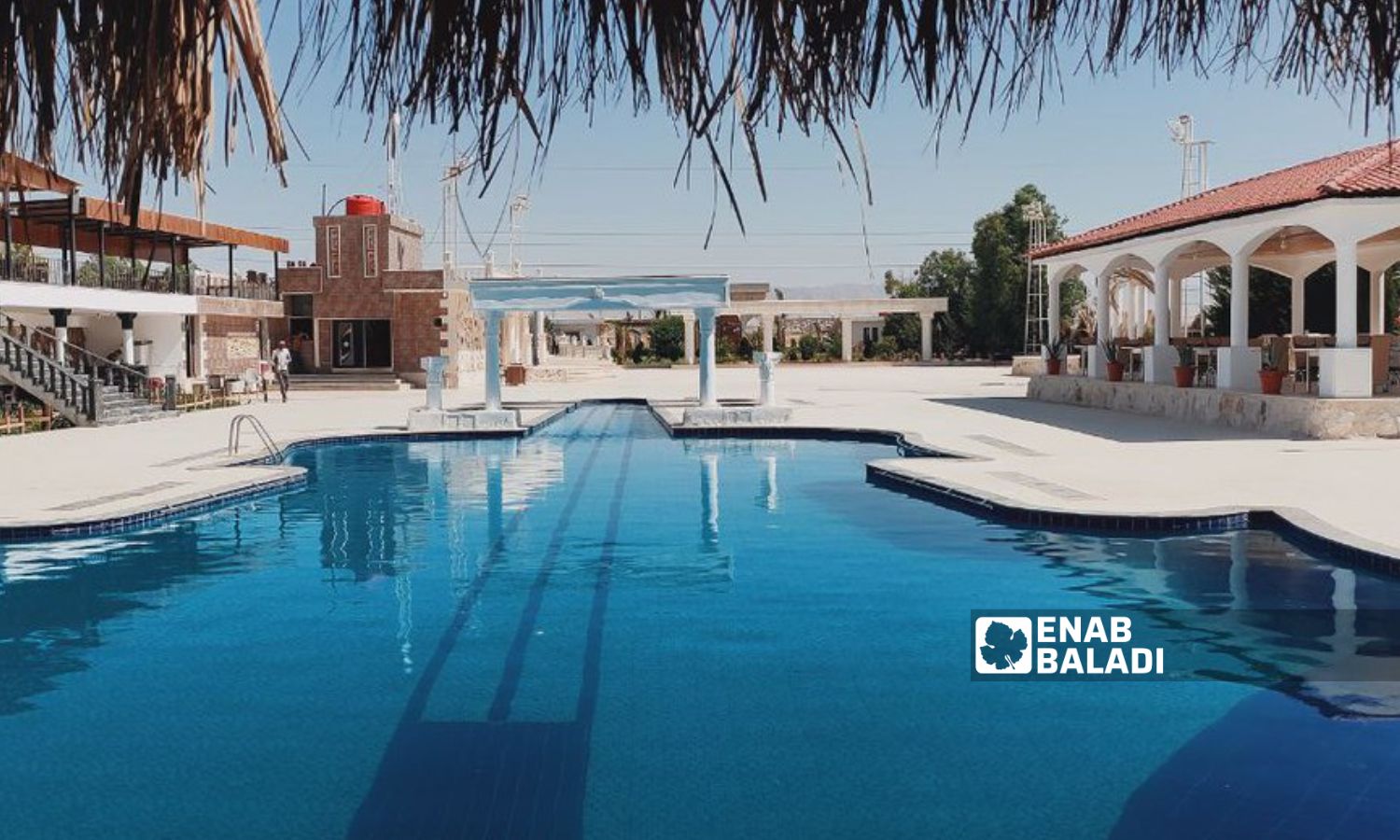



Al-Hasakah – Majd al-Salem
High temperatures over the past weeks in the northeastern governorate of al-Hasakah, which exceeded 40 degrees Celsius, led to a high demand for public swimming pools within the city in light of the power outages and the lack of traditional means of cooling.
On an almost daily basis, Yazan Mahmoud, 25, spends about three hours in one of the swimming pools in his city of Qamishli during the afternoon, escaping from the summer heat.
“Going to the swimming pools has become a summer habit, far from being a sport, and the people of the region may find in it an opportunity for entertainment, but the summer heat is its first motive,” Mahmoud told Enab Baladi.
Many of Mahmoud’s friends leave their homes these days and go to public swimming pools during the noon hours, when “the temperatures are the hottest.”
The young woman, Berivan, 19, of Qamishli city, told Enab Baladi that the remarkable demand by girls to practice and learn to swim in the high temperatures is prompting many swimming pool owners to allocate time for families or women only.
It is forbidden for males to enter during these times to give girls a better private space to enjoy swimming and get rid of the summer heat.
Twice a week, Berivan goes to the Miri Land swimming complex with her sister or a group of her friends.
Her motive is that she “cannot bear the heat at home,” she told Enab Baladi.
At the same time, Berivan complains about the high prices of tickets to enter the swimming pools, as the entry price per person ranges between 10,000 and 15,000 SYP and sometimes reaches 20,000 at peak hours (midday) and when temperatures rise.
With the high demand for swimming pools, Berivan and others whom Enab Baladi met have concerns about “the extent of cleanliness of these facilities and their adherence to health standards.”
The girl said that one of her friends suffered from skin allergies days after she went to one of the city’s swimming pools, and against the background of that, she became keen to choose a swimming pool with clean water.
For his part, an employee of the Bella swimming pool in Qamishli, who asked not to be named for security reasons, told Enab Baladi that the pools are well received, and the age groups range between 12 and 42 years, and the entrance prices are 10,000 SYP for adults and 7,000 SYP for children, and there are discounts for university students.
Tareq al-Sfouk, 45, in charge of a swimming pool in Qamishli, explained to Enab Baladi the standards he applies to keep the water clean.
Al-Sfouk said, “The technical condition varies from one pool to another, as some of them are subject to good and continuous maintenance, and periodic cleaning and sterilization operations, while others need repair and more attention to cleanliness,” and the second section is known as “public swimming pools.”
He added that the most common pool problems that customers should pay attention to are the cracks in the walls of the pool itself and the erosion of its outer layer, as it becomes a “nest of algae and bacteria” in this case.
Al-Sfouk believes that the constant work of pumps and filters, and the purity and clarity of the water, are two important factors that must always be paid attention to. Whenever the water is cloudy, there is an indication that the water has not been replaced.
He added that it is better to change the water twice a day, in the morning and evening, and to have a lifeguard constantly near the swimming pool, especially in the areas designated for children.
With regard to hygiene procedures, the Bella pool employee said that they are taking all necessary measures to ensure the cleanliness of the pools, and the sterilization and filtering process begins from five in the evening until six in the morning.
Regarding the suitability of prices for the economic conditions of citizens, al-Sfouk believes that they are “appropriate” as the work of swimming pool owners is “seasonal” during the summer season only, and they are closed for the rest of the seasons, while the owner of the facility continues to pay taxes despite this.
Many of the residents interviewed by Enab Baladi believe that public swimming pools are not clean, no matter how they appear to be the opposite, including Muhammad al-Ali, 39, who hails from al-Qahtaniya region.
Al-Ali told Enab Baladi that he prefers to buy a small plastic swimming pool for his children to put at home. From another angle, it is an “economical, healthy, and fun” solution for children.
Public swimming pools are a source of disease, according to al-Ali, in addition to the high entrance fees, compared to the prevailing economic situation in the northeastern region.
The prices of this type of swimming pool, according to what Enab Baladi monitored in Qamishli, range between 50,000 and 200,000 Syrian pounds, depending on their quality and size. They are often made of plastic materials and can be folded and moved anywhere in the house.
On the road between Qamishli and al-Qahtaniya, or between Qamishli and Amuda, several resorts have been built with swimming pools, which are popular with well-off locals, but they are not an option for most residents due to the high entrance fees.
Among the visitors of these resorts, Milad al-Issa, 28, of Qamishli, who told Enab Baladi that he goes to one of these swimming pools once a week.
On his last visit to one of these resorts, al-Issa spent about one million Syrian pounds, he told Enab Baladi.
The high cost of these swimming pools is due to the privacy they provide and the level of services provided, such as food, drink, and others. They are also a destination for recreational trips conducted by organizations operating in the region, especially for holding seminars or workshops.
if you think the article contain wrong information or you have additional details Send Correction